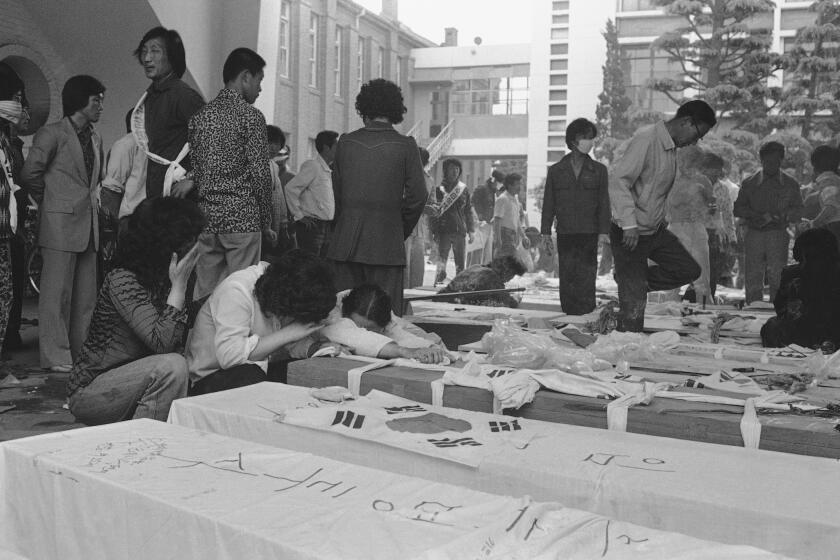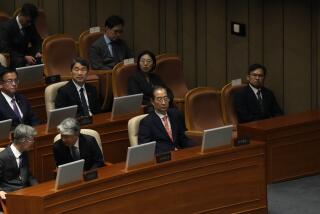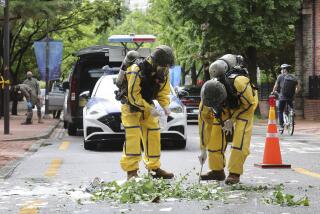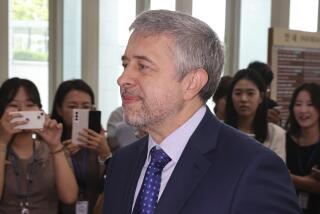South Korean president declares martial law, then backs down amid calls for his impeachment

SEOUL — South Korean President Yoon Suk-yeol declared emergency martial law late Tuesday before backing down, temporarily placing the military in control of all government and judicial functions in a power grab that came after months of political stalemate. The hours of crisis and chaos have thrown the future of his presidency into doubt.
As the military and police sought to contain protesters who had poured into the streets around the National Assembly, the president announced he would lift the order as soon as he could convene his Cabinet, heeding a defiant vote from the opposition-led legislature. The Cabinet met before dawn Wednesday, according to South Korea’s Yonhap news agency, as protesters chanted for Yoon’s impeachment.
It remained unclear what immediately precipitated Yoon’s decree — the first time martial law has been declared in South Korea since 1980, when a military junta ruled the country.
In a televised address to the nation announcing his declaration of martial law, Yoon called the legislature a “den of criminals” engaged in “legislative tyranny” and “anti-state activities.”
“Honorable citizens, as president, I appeal to you with a feeling of spitting blood,” he said.
Accusing his opponents of being “shameless pro-North Korean anti-state forces that are plundering the freedom and happiness of our people,” Yoon lambasted lawmakers for rejecting his government budget proposal and moving to impeach several public officials.
His presidency has been beset by scandal since soon after he took office in 2022, with relentless accusations that he and his wife had abused their positions for personal and political gain.
As South Korea confronts a dark chapter of its history, a former soldier’s quest for repentance becomes a lesson in the fragility of memory.
Yoon’s approval ratings have plummeted in recent months amid growing calls for his impeachment.
South Korean television broadcast Yoon’s address over and over again. One news anchor said in grave disbelief that “we are now reporting a situation to you that we had only seen in movies.”
Army Chief of Staff Gen. Park An-su, whom Yoon had named martial law commander, banned all political activity and proclaimed that the media were under military control.
South Korea’s president has made combating disinformation a centerpiece of his agenda. But free press advocates say his vow to keep reporters honest is a pretext to intimidate his critics
Outside the National Assembly, around a thousand protesters tussled with police guarding the gates as military helicopters hovered overhead. Bundled in thick winter jackets, they waved banners and umbrellas, chanting, “Lift the martial law!”
Reporters, legislative staff members and lawmakers had barricaded themselves inside the building as soldiers stormed the entrance, shattering a window and setting off what appeared to be a smoke grenade or tear gas canister in an attempt to force their way in.
Early Wednesday — less than three hours after Yoon declared martial law — the legislature voted to overturn his decree. By law, the president is required to lift his order immediately. Yoon soon announced he would comply.
Upon learning of the vote, the protesters broke out in cheers, which quickly turned into another increasingly familiar refrain: “Impeach Yoon Suk-yeol!”
In the minds of most South Koreans, martial law is strongly associated with the country’s pre-democratic military dictatorships, which used it as a tool to crush political dissent, oftentimes with violence.
Under a state of martial law, the military can restrict citizens’ basic rights, including detaining or searching them without a warrant. Crimes can be prosecuted in military courts.
The last leader to declare emergency martial law was Gen. Chun Doo-hwan, who rose to power in a coup in 1979. Chun declared martial law over the country in 1980, during which his military opened fire on pro-democracy protesters in the city of Gwangju, killing at least 165.
Im Chae-moo made a small fortune as a heartthrob actor in South Korea. He spent it all on a theme park for children.
This is not the first time that democratically elected presidents have toyed with martial law.
Under former President Park Geun-hye, a conservative politician whose corruption scandal led to her impeachment in 2017, military officials had secretly prepared their own plans of declaring martial law in the event that the courts upheld her impeachment. But Park would ultimately be ousted and jailed without those plans ever being set into motion.
In September, opposition politicians raised the alarm that Yoon was preparing to declare martial law, citing the fact that Kim Yong-hyun, the defense minister, had held an uncustomary meeting with the three military commanders who would probably play key roles in a martial law government.
At the time, the presidential office denied the allegations, which it dismissed as political incitement akin to Stalinism or Nazism.
Yoon, a former prosecutor, rose to political prominence as a straight-shooting investigator who handled high-profile corruption cases.
But since being elected president May 2022, he has been a divisive leader, inviting controversy by engaging in misogynistic rhetoric and cracking down on critical news outlets.
Yoon has been accused of interfering in a military investigation into the death of a young marine who drowned during a search and rescue operation last year, while his wife has been under fire for accepting a luxury handbag from a Korean American pastor in what critics have characterized as a clear case of graft.
For decades, South Koreans came to the U.S. for a better life. Now many of them are returning, but some say they are encountering a ‘forever foreigner mentality’
The opposition party has also moved to impeach Yoon’s interior minister, whom it holds responsible for a crowd crush that killed more than 150 people on Halloween in 2022.
In addition, legislators from the liberal Democratic Party have tried to remove several prosecutors who investigated Lee Jae-myung, their leader and presidential hopeful.
In April, Yoon’s conservative People Power Party suffered a crushing defeat in the parliamentary general elections, which many saw as a referendum on his presidency.
On Tuesday, legislators of all stripes quickly denounced Yoon’s decree of martial law.
“There is no reason to declare martial law. We cannot let the military rule this country,” Lee said in a video he recorded in a car on his way to the National Assembly. “President Yoon Suk-yeol has betrayed the people. President Yoon’s illegal declaration of emergency martial law is null and void. From this moment on, Mr. Yoon is no longer the president of South Korea.”
Even the leader of Yoon’s party, Han Dong-hoon, condemned the president’s actions as unconstitutional.
“With the National Assembly’s vote to lift it, the state of emergency martial law has now been rendered invalid,” he said.
More to Read
Sign up for Essential California
The most important California stories and recommendations in your inbox every morning.
You may occasionally receive promotional content from the Los Angeles Times.















